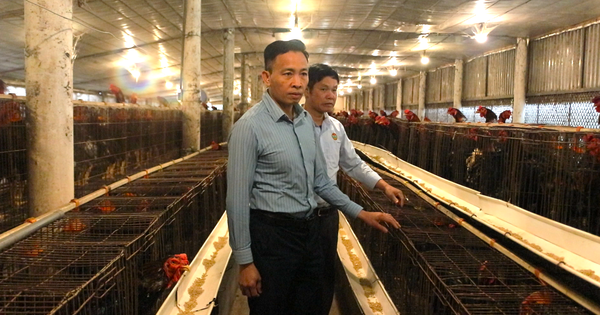Mr. Nguyen Van Tuan, a real estate broker in Hai Duong, shared that since the end of 2023, many investors have unexpectedly asked him to help them find and buy land plots without red books but without disputes or violations. Normally, these plots of land are very cheap compared to other plots of land, but the purchase and sale will be carried out with handwritten documents.
" Many rural areas in Hai Duong have now been urbanized, with land prices in some places reaching nearly 20 million VND/m2. Meanwhile, plots of land in the same location but without a red book are only half the price, or even 1/3, " said Mr. Tuan.
Mr. Tuan cited a plot of land of more than 200 square meters without a red book in Cam Giang district (Hai Duong) that is currently being sold for about 7 million VND/m2. Meanwhile, about 500 square meters away, another plot of land with a red book is being sold for 14 - 15 million VND/m2.

In anticipation of the revised Land Law, many people are looking to buy land without a red book. (Illustration: Labor)
Explaining why many people have been looking to buy land without a red book recently, Mr. Tuan said that it is due to the psychology of anticipating the revised Land Law coming into effect, which will make the issuance of red books more convenient.
" Extending the land use period by 10 years compared to the old regulation also makes it easier for people to issue certificates. After buying land without certificates at a cheap price, investors can easily make red books and resell them at a higher price to make a profit, " said Mr. Tuan.
Sharing the same opinion, Mr. Tran Van Hung, a customer in Hanoi, also shared that before Tet, he decided to buy a piece of land without a red book in Thanh Tri district (Hanoi) for 800 million VND. The land has an area of 50 square meters, and the homeowner's family has lived there stably since 2003.
" Because the land use period is extended until 2014, the issuance of a red book for this land will also be more convenient ," Mr. Hung shared.
However, according to Mr. Hung, making a red book for land without papers is still complicated and risky, so even though the homeowner agreed to reduce the price by 100 million VND if paying all at once, Mr. Hung still refused, only accepting a deposit of 50% of the total value and paying the rest when the homeowner makes the red book and transfers the name. The buyer will bear all of this cost.
" Even though the land is cheap and depositing money is risky, if the land has a red book, it will no longer have that price. When investing, you just need to see a bright opportunity and accept the risk, " said Mr. Hung.

Buying land without a certificate has many potential risks. (Illustration photo)
What should you pay attention to when buying land without a certificate?
According to Mr. Nguyen Van Dinh, a real estate legal expert, Article 138 of the 2024 Land Law recently passed by the National Assembly stipulates the granting of certificates of land use rights and ownership of assets attached to land (called "red books") to households and individuals using land without documents on land use rights without violating land laws and not in cases of land allocation beyond authority.
Accordingly, the draft has expanded, allowing the issuance of red books for cases of land use before July 1, 2014, now confirmed by the People's Committee at the commune level as having no disputes, then the land use rights will be recognized.
This regulation is actually being applied, only extending the time limit from before July 1, 2004 to before July 1, 2014, which is an additional 10 years compared to the 2013 Land Law. Note that Article 138 is to handle the issuance of certificates for cases that do not violate land laws, do not allocate land beyond authority, that is, in essence, there is no wrongdoing such as land encroachment.
This law mainly deals with cases where the land is left by our ancestors and has been used for a long time. However, it may be because the people are in areas with difficult socio-economic conditions, because their understanding of the law is limited, or because the people do not have the need to transfer the land, so they do not register to get a red book.
" I agree with this expansion to ensure harmony of people's interests. The most important thing here is that people do not violate land laws and do not have unauthorized land allocation, so their rights need to be protected, " Mr. Dinh emphasized.
However, according to Mr. Dinh, in reality it will not be easy to complete the issuance of red books to people.
For example, if people still do not submit documents to carry out procedures for granting land use right certificates, state agencies have no basis to carry out the procedures.
In addition, some cases where land was previously allocated by the People's Committee of the commune, which was a case of land allocation beyond authority, also encountered difficulties in applying for red books.
Furthermore, the procedure for requesting the People's Committee at the commune level to confirm that the land is not in dispute also arises in cases where there are civil disputes between land users (typically cases where land is transferred through many people through handwritten documents or cases where parents leave inheritance or gift land use rights to their children but there are conflicts or disputes between the children over inheritance rights...).
Regarding the purchase and sale by deposit contract, Mr. Dinh said that the deposit transaction to transfer land use rights as above is legal, not against the law, however, the parties need to clearly agree in writing, sign a deposit contract with detailed and specific terms on the rights and obligations of the parties.
The information that customers need to pay attention to is information about the transferred land plot; deposit amount and form of deposit transfer; land use right transfer price and form and payment term; financial obligations when issuing red books to Party A and who is responsible for this obligation; contract performance period; responsibilities of Party A and Party B if they do not fulfill their obligations (deposit penalty amount); rights and obligations of the parties...
According to the law, deposit contracts are not required to be notarized, however, for contracts of great value, the parties should choose notarization to ensure their rights and prevent disputes from occurring. The delivery and receipt of deposits should also be done through a bank, with a delivery and receipt record.
Source



![[Photo] Prime Minister Pham Minh Chinh chairs meeting to remove difficulties for projects](https://vstatic.vietnam.vn/vietnam/resource/IMAGE/2025/3/30/7d354a396d4e4699adc2ccc0d44fbd4f)



![[Photo] Ministry of Defense sees off relief forces to the airport to Myanmar for mission](https://vstatic.vietnam.vn/vietnam/resource/IMAGE/2025/3/30/245629fab9d644fd909ecd67f1749123)



















































































![[REVIEW OCOP] An Lanh Huong Vet Yen Cat](https://vstatic.vietnam.vn/vietnam/resource/IMAGE/2025/3/27/c25032328e9a47be9991d5be7c0cad8c)






Comment (0)